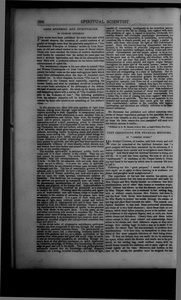<Untitled> (Letter to Baltimore Underwriter by H. S. Olcott)
...
Leon Hyneman and Spiritualism
Few works have been published for some time past which should deserve the attention of careful students of all grades of thought more than the admirable pamphlet on “The Fundamental Principles of Science,” written by Leon Hyneman, an old and valued worker in the cause of liberal reform. Those who have watched the history of modern Spiritualism need hardly be reminded that the author for years past has been a devoted Spiritualist, and that all his utterances have been filled with a profound reliance on the future individual consciousness of spirit life.
The introductory chapter in his new effort is headed “Man and Woman Counterparts—A Dual Unit,” and shorn pretty plainly his belief rests on the same androgynous basis which many other philosophers, since the days of Zoroaster, have insisted on. In other chapters, he traces “The Law of Unfoldment,” in the Cosmos more especially, regarding the human family, and what he considers should be accepted as the proper basic principles of the philosophy of the debatable land of matter and spirit. He winds up his deeply erudite and interesting labors with a survey of “The Dualistic Principles in the Economy of Sex.” The following quotations from his valuable pamphlet will be doubtless perused with interest by those who would know something of the author’s views: —
In this present era—blest with pure sparkles of light from heaven, coming down through angel ministration to souls receptive according to their capacities to comprehend and express the golden truths eliminated, to save mankind from ancient superstitions, and deliver them from the bondage of death and its terrors inspired by false teachers of hell and damnation, and of a devil possessing power to circumvent the divine purposes—it is lamentable to see the many doubting Thomases, who will not believe, will not accept the gospel of salvation, which gives happiness and joy to humanity; relieves sorrowing hearts in lapsing death, and proves continuous, never-ending life. Glorious gospel, which brings the knowledge (not a mere belief) and proof of unceasing conscious existence in actual communing with loved ones who have passed to spirit-life, and who give that most positive and unmistakable evidence of their identity, which sincere men and women have ever looked and prayed for, but never found in any of the creedal religions!
The invisible spirit-world is embraced within God’s universe, and is in close relation to the visible. They are not and cannot be separated. The visible is illustrative of the invisible; they are correspondences. The same laws rule in both. In this life we associate with and seek those with whom we are in affinity. It is ever the same in spirit-life. There and here we are attracted to those upon the same plane of thought and life. The law of association governs in both spheres, only in spirit-life we have a broader comprehension of the cause of human activities, and look with a more lenient eye upon the weak, ignorant, misdirected children of humanity. The world has yet to recognize that all things in the universe are governed by immutable lasts—all Nature in its phenomenal manifestations, all and every act, spiritual, mental, and physical, of the human kind. Supernaturalism is a theological deception, invented by priestcraft as a meant to enslave the mind. Working upon the credulity and ignorance of weak-minded men and women, either to inspire fear or wonder in the relation of miracles, the priests have been wonderfully successful It is a part of their trade, and, in this age of light, many cultured minds accept and believe the mythic tales of supernatural acts said to have been performed by God, the Church, and its ministers. There is nothing supernatural in the communion of spirits in the physical form with those in the spirit form. It is the same as one individual conversing with another in mundane life. The conditions must exist to bring each into rapport with the other. Spirit-communion is an accomplished fact, however much professors of so-called religion and self-opinioned scientists may deny and decry it.
In the divine order of progressive unfoldment, spirit-communion was first recognized in this era, through the medium of intuitive, youthful, feminine forms. The spirit world rejoiced at the event, and a dear-seeing humanity hailed the advent with gladness and joy, as a jubilee portentous of the earning time, when peace and good will would reign on earth. It was an immaculate conception, an unfolding through woman's form of that glorious movement, so much deprecated by Christian teachings, of Mother Eve introducing the knowledge of good and evil in the world. The fruit of that glorious movement ripened into the knowledge—through woman’s intuition—of a loving, invisible humanity, in a world of light, capable of communing intelligently to the conscious perceptions of those in this life by coming into rapport with them. The problems of ages, in regard to miracles, witchcraft, divinations, dreams and correlated psychologic phenomena, are solved—nay, more, immortality, in continuous, never-ending, conscious life, is clearly proved, and no longer a matter of doubt with those who accept the light of this God-revealed gospel. Since this heaven inspiring dispensation was inaugurated, in the wisdom of prescient judgment, the general mind has been unsettled, unhinged, drifting hither and thitherward. Governments and the people appear to be at war. Bloody and cruel wars have been fought, and, notwithstand- <... continues on page 1-167 >
Editor's notes
Sources
-
Spiritual Scientist, v. 4, No. 23, August 10, 1876, p. 268


